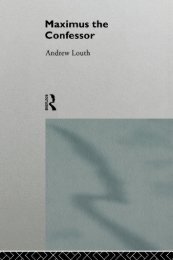Gospels of Thomas and Philip and Truth - Syriac Christian Church
Gospels of Thomas and Philip and Truth - Syriac Christian Church
Gospels of Thomas and Philip and Truth - Syriac Christian Church
Create successful ePaper yourself
Turn your PDF publications into a flip-book with our unique Google optimized e-Paper software.
This allusion strongly conveys a maternal concept <strong>of</strong> the Paraclete.<br />
Now <strong>of</strong> course ΠΝΕΥΜΑ in Greek is neuter <strong>and</strong> ΠΑΡΑΚΛΗΤΟΣ masculine,<br />
while SPIRITUS <strong>and</strong> ADVOCATUS in Latin are both masculine in gender. Hence starting<br />
from the earliest versions <strong>of</strong> both the Old <strong>and</strong> New Testaments in non-Semitic<br />
tongues, the very idea was lost which <strong>Thomas</strong> is conveying <strong>and</strong> <strong>Philip</strong> emphasizing<br />
in the foregoing quotations. Thus from having the neuter form ΤΟ ΠΝΕΥΜΑ instead<br />
<strong>of</strong> a feminine form Η ΠΝΕΥΜΗ in Greek, we pass to e.g. ‘el Espíritu’ instead <strong>of</strong> ‘la<br />
Espíritu’ in Spanish, ‘der Geist’ instead <strong>of</strong> ‘die Geist’ in German, <strong>and</strong> in English ‘he/<br />
him’ in place <strong>of</strong> ‘she/her’ referring to the Helpmate (Heb, Mxn-m: participle, <strong>and</strong> thus<br />
without gender) in Jn 16:7 ff.<br />
We need hardly remind ourselves <strong>of</strong> the confusions, schisms <strong>and</strong> even religious<br />
machismo to which this gender-shift has given rise across the centuries, as<br />
theologians struggled to make sense <strong>of</strong> a presumably all-male Trinity. Thus, as is<br />
well known, the Orthodox/Catholic rupture <strong>of</strong> 1054 AD resulted from the vexed<br />
‘filioque’ controversy, over the procession <strong>of</strong> the third member <strong>of</strong> the Trinity. 1 With the<br />
Sacred Spirit as a maternal figure, however, the underlying idea is clarified: Father<br />
God <strong>and</strong> Mother Spirit <strong>and</strong> Incarnate Son as the basic mystery <strong>of</strong> three-in-one, the<br />
threefold Godhead. Here the concept is evidently that <strong>of</strong> a transcendental holy<br />
family, in which the Divine Child— <strong>and</strong> indeed each child 2 (Mt 18:10, Jn 11:52)— is<br />
eternally born, not <strong>of</strong> the physical union between human parents, but rather <strong>of</strong> the<br />
mystical union between the paternal <strong>and</strong> maternal aspects <strong>of</strong> the Divinity:<br />
Thus, as to the filioque controversy, it is precisely a third possibility— <strong>and</strong> neither<br />
the Oriental nor the Occidental doctrine— that resolves the issue: the Sacred Spirit<br />
does not proceed from the Father either with or without the Son, but rather the Son<br />
proceeds (is born) from the Father joined with the Sacred Spirit. This logically<br />
1 Filioque: combination <strong>of</strong> Latin words meaning ‘<strong>and</strong> <strong>of</strong> the Son’, added to the Nicene Creed <strong>of</strong> 325 AD by the Visigothic III<br />
Council <strong>of</strong> Toledo in 589 AD: CREDO IN SPIRITUM SANCTUM QUI EX PATRE {FILIOQUE} PROCEDIT: ‘I believe in the Sacred Spirit, who<br />
proceeds from the Father {<strong>and</strong> the Son}’; the Orthodox <strong>Church</strong> did not accept the inclusion, leading to the final rupture <strong>of</strong> 1054<br />
AD between the Eastern <strong>and</strong> Western <strong>Church</strong>es.<br />
2 I assume that ΜΟΝΟΓΕΝΗΣ (‘uniquely born’) in Jn 1:14 refers to the singularity <strong>of</strong> the Virgin Birth, <strong>and</strong> not to Christ's being<br />
the only Son; see Jn 1:12-13 20:17.<br />
116




